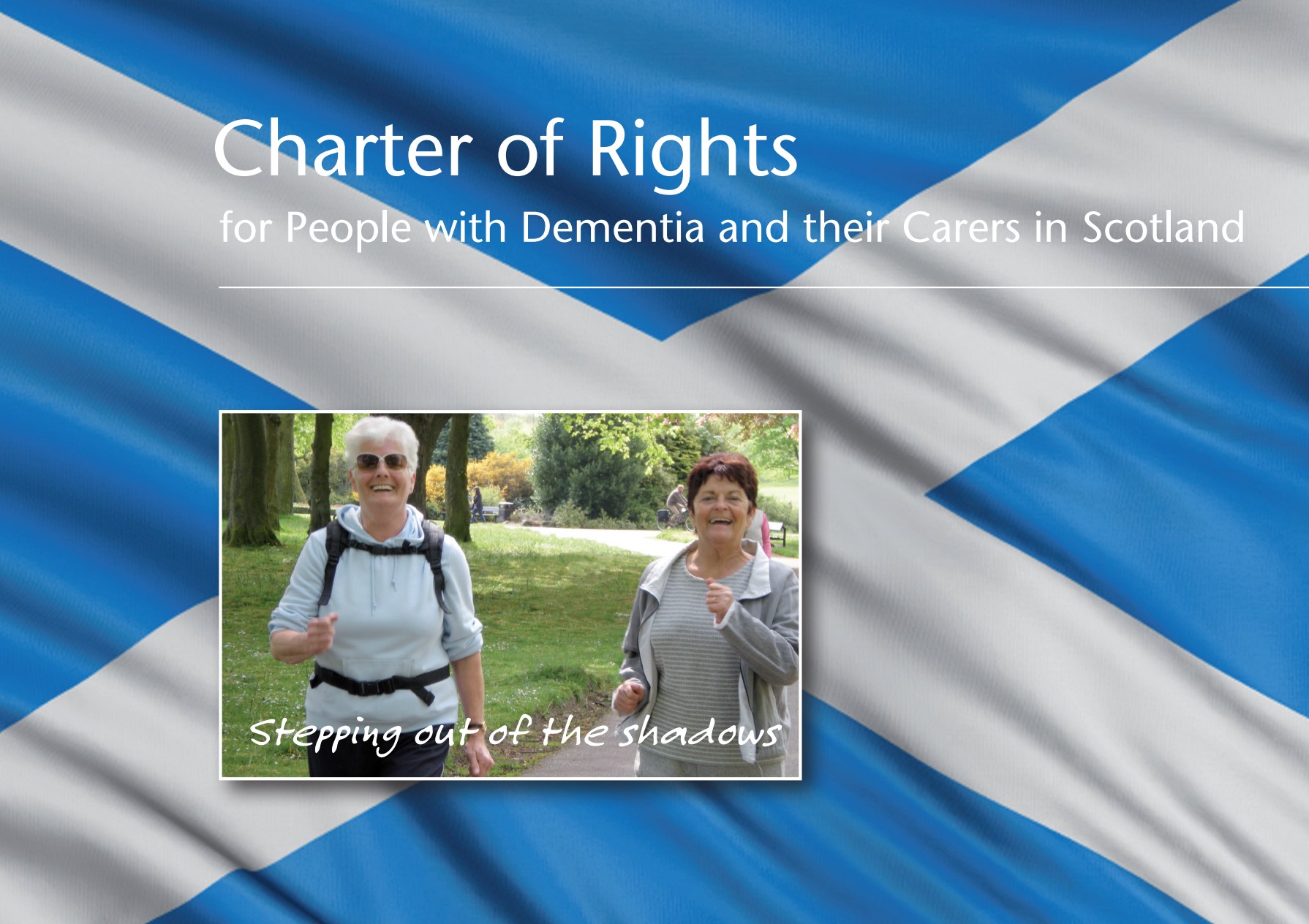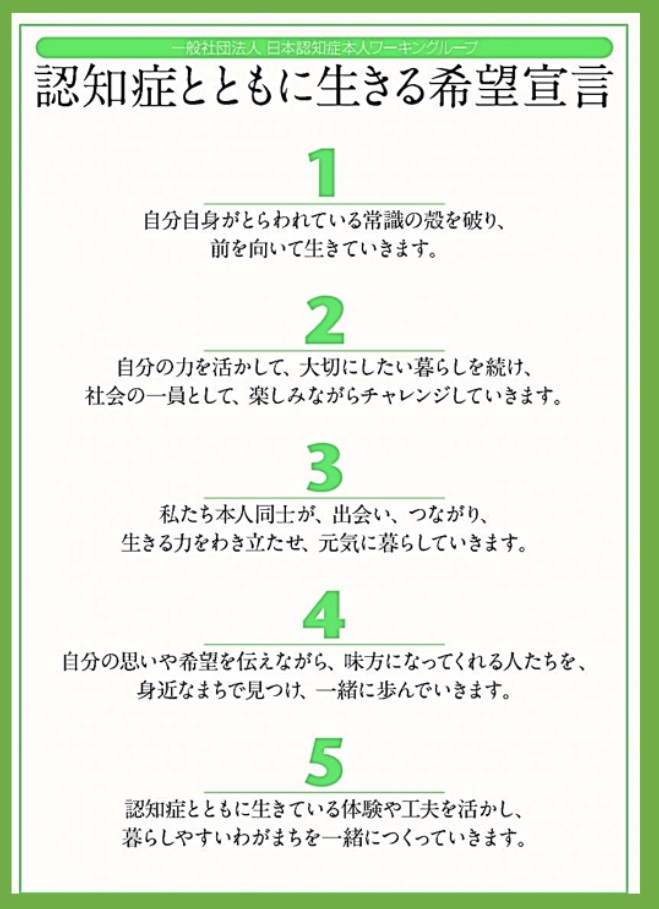[HGPI Policy Column] No. 2 – from Dementia Policy Team-
date : 8/19/2019
Tags: Dementia, HGPI Policy Column
![[HGPI Policy Column] No. 2 – from Dementia Policy Team-](https://hgpi.org/en/wp-content/uploads/sites/2/13db44f7adc2802f4c06607f5dbdcb1f.jpg)
For our second column, we will continue our discussion on trends in dementia policy in Japan and overseas and introduce efforts for involving people with dementia in those processes.
Transitioning to policies based on the human rights of people with dementia
A human rights-based approach for dementia policy has drawn attention in recent years and awareness of the importance of such an approach is increasing. In a human rights-based approach, people with dementia are informed of their rights and enabled to advocate independently. Meanwhile, the capacities of individuals and organizations responsible for respecting, protecting, and enforcing those rights are enhanced and they are made more accountable for raising awareness of those rights. That will create more opportunities for people with dementia to become involved in the decision-making process for new policies and other developments that will affect their rights. In turn, the people responsible for enforcing the rights of people with dementia and their caregivers will gain a better understanding of and increased respect for those rights. We also aim to utilize such an approach not only for decisions involving everyday living but also in the policy-creation process so that the rights of people with dementia are more widely recognized.
The guidelines issued by the World Health Organization (WHO) entitled “Ensuring a human rights-based approach for people living with dementia” use the PANEL Approach as the representative indicator of such a process.
P: Participation (in the decision-making process)
A: Accountability
N: Non-discrimination
E: Empowerment
L: Legality (respect for the rule of law)
This approach is also promoted by Scotland’s Charter of Rights for People with Dementia and their Carers. Enacted in 2009, this Charter emphasizes the importance of recognizing and respecting the rights of people with dementia and their caregivers through the PANEL Approach in all facilities, care provision, and efforts for dementia. It will be examined in this column and in an upcoming special feature.

As for developments in Japan, efforts for promoting the stories and opinions of people with dementia among society as a whole are increasing day by day, such as through the Japan Dementia Working Group’s (JDWG) 2018 Declaration of Hope on Living with Dementia.

Developments in dementia policy in Japan
In response to global trends, initiatives that emphasize the perspectives of people with dementia and their families have also started in Japan.
Every member of the G7 agreed to host conferences to follow up on the 2013 dementia summit. The follow-up event in Japan was held on November 2014 with the theme of a new care and prevention model. At the event, the then Minister of Health, Labour and Welfare Yasuhisa Shiozaki announced that planning for a successor to the Five-Year Plan for the Promotion of Dementia Measures (the Orange Plan) was underway. That successor, the Comprehensive Strategy to Accelerate Dementia Measures (the New Orange Plan), was announced the following year in 2015. Together with the Organization for Economic Co-operation and Development (OECD), HGPI held a side meeting to the November 2014 follow-up event called the “Taking Action on Dementia: Opportunities for Social Investment – A G7 Global Dementia Legacy Event Private Sector Side Meeting.”
Under the New Orange Plan, the shared concept behind each new policy is an emphasis on the perspectives of people with dementia and their families. As indicated by the G8 Declaration and Communique covered in our last column as well as by WHO Guidelines, all discussions concerning dementia emphasize these perspectives, whether those discussions are about developing recognition for dementia, the provision of daily care and every type of service, or research and development. It has also been specified that discussions will continue to emphasize the perspectives of people with dementia and their families in the future.
In conclusion
In recent years, more domestic policies are being created based on conclusions reached by international summits such as the G7 or the G20 to respond to international challenges like dementia.
Many developed countries face issues related to aging such as dementia and developing countries will face such issues in the future. It is insufficient if efforts to overcome these issues are led by any single country. Global cooperation from multi-stakeholders is needed. As for the process of policy creation in such an environment, it is important that as many stakeholders as possible that are affected by the new policies are involved in the creation process. In the field of dementia, the perspectives of people with dementia and their caregivers, their family members, in particular, must also be incorporated into new policies.
We are once again reminded of our sincere desire to cooperate with everyone and organically integrate the experiences and wisdom of people with dementia and their families into HGPI and Designing for Dementia Hub activities in the pursuit of more effective dementia policy.
Next time, we will cover the latest topics in dementia policy from international summits held in July 2019.
[Reference materials]
New Orange Plan Dementia Research, The Pace of Medicine, Volume 247 Number 5
Health Global Policy Institute (2018) “Japan Health Policy Now Dementia Edition”
[Introducing the author]
Shunichiro Kurita (Senior Associate, Health and Global Policy Institute / Steering Committee Member, Designing for Dementia Hub)
Top Research & Recommendations Posts
- [Policy Recommendations] The Path to a Sustainable Healthcare System: Three Key Objectives for Public Deliberation (January 22, 2026)
- [Research Report] Perceptions, Knowledge, Actions and Perspectives of Healthcare Organizations in Japan in Relation to Climate Change and Health: A Cross-Sectional Study (November 13, 2025)
- [Research Report] The 2025 Public Opinion Survey on Healthcare in Japan (March 17, 2025)
- [Policy Recommendations] Reshaping Japan’s Immunization Policy for Life Course Coverage and Vaccine Equity: Challenges and Prospects for an Era of Prevention and Health Promotion (April 25, 2025)
- [Research Report] The 2023 Public Opinion Survey on Satisfaction in Healthcare in Japan and Healthcare Applications of Generative AI (January 11, 2024)
- [Research Report] AMR Policy Update #4: Cancer Care and AMR (Part 1)
- [Policy Recommendations] Developing a National Health and Climate Strategy for Japan (June 26, 2024)
- [Public Comment Submission] “Assessment Report on Climate Change Impacts in Japan (Draft Overview)” (December 24, 2025)
- [Research Report] Survey of Japanese Physicians Regarding Climate Change and Health (December 3, 2023)
- [Research Report] The Public Opinion Survey on Child-Rearing in Modern Japan (Final Report) (March 4, 2022)
Featured Posts
-
2026-01-09
[Registration Open] (Hybrid Format) Dementia Project FY2025 Initiative Concluding Symposium “The Future of Dementia Policy Surrounding Families and Others Who Care for People with Dementia” (March 9, 2026)
![[Registration Open] (Hybrid Format) Dementia Project FY2025 Initiative Concluding Symposium “The Future of Dementia Policy Surrounding Families and Others Who Care for People with Dementia” (March 9, 2026)](https://hgpi.org/en/wp-content/uploads/sites/2/dementia-20260309-top.png)
-
2026-02-05
[Registration Open] (Webinar) The 141st HGPI Seminar “Current Status and Future Prospects of Korea’s Obesity Policy: Voices of People with Lived Experience in Policy Promotion” (March 3, 2026)
![[Registration Open] (Webinar) The 141st HGPI Seminar “Current Status and Future Prospects of Korea’s Obesity Policy: Voices of People with Lived Experience in Policy Promotion” (March 3, 2026)](https://hgpi.org/en/wp-content/uploads/sites/2/hs141-top-1.png)
-
2026-02-06
[Research Report] AMR Policy Update #5: Cancer Care and AMR (Part 2)
![[Research Report] AMR Policy Update #5: Cancer Care and AMR (Part 2)](https://hgpi.org/en/wp-content/uploads/sites/2/HGPI_20260204_AMR-Policy-Update-5.png)




